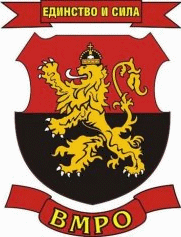Bulgaria - VMRO - Bulgarian National Movement
 VMRO refers to the abbreviated name of the Internal Macedonian Revolutionary Organization, a Bulgarian irredentist revolutionary and political organization whose earliest version was founded in the then Ottoman-controlled historical region of Macedonia in 1893 and of which VMRO - Bulgarian National Movement is a self-proclaimed successor. The organization was initially restored in 1990 as an NGO called VMRO - Union of Macedonian Associations, the latter being educational organizations of descendants of refugees from Macedonia that existed in Bulgaria under the communist regime.
VMRO refers to the abbreviated name of the Internal Macedonian Revolutionary Organization, a Bulgarian irredentist revolutionary and political organization whose earliest version was founded in the then Ottoman-controlled historical region of Macedonia in 1893 and of which VMRO - Bulgarian National Movement is a self-proclaimed successor. The organization was initially restored in 1990 as an NGO called VMRO - Union of Macedonian Associations, the latter being educational organizations of descendants of refugees from Macedonia that existed in Bulgaria under the communist regime.
Notions like nationalism, national conservatism and right-wing populism that are associated with the party only apply to certain elements of VMRO's positions. Even tenets routinely associated with it as anti-globalism and anti-immigration are highly nuanced in its policies. VMRO's ties with the European Conservatives and Reformists (ECR) (the Bulgarian party's two MEPs are part of that political group in the European Parliament) also blur the focus, as the ECR is described as economically liberal, conservative and Christian democratic. In Bulgaria, VMRO's "rightist" image is to a certain extent a by-product of the party's vehement rejection of the policies of the Bulgarian Socialist (formerly Communist) Party (BSP).
Traditionally, VMRO projects a patriotic, non-partisan, and extra-ideologicical image. The party gradually becomes a proponent of the enlightened European nationalism of the 19th and 20th century, which may seem outdated but continues to appeal to many educated and well-integrated voters.
Bulgarian voters can easily extrapolate VMRO's positions from its systematically anti-Turkish rhetoric criticising President Erdogan's governance. VMRO's anti-Roma rhetoric gets even more readily recognizable messages across to voters thanks to its concept to solve the problem with outcast Roma groups through community service and control of teen births. VMRO's self-proclaimed status as "the most patriotic and most Bulgarian organization" is borne out by its sector policies, promoting free enterprise by removing administrative hurdles to business, a balanced state-business relationship, and protecting Bulgarian agriculture, production, etc. Bulgarian family, Bulgarian children, Bulgarian language and Eastern Orthodox Christianity are seen by VMRO as coming under external threats, and their defence is forcefully present in all the party's messages.
Traditionally, VMRO pays special attention to Bulgarian minorities abroad and in particular in the Balkans. The party insists that members of the Bulgarian diaspora, especially in Ukraine and Moldova, "should be given an option to settle in Bulgaria and develop." VMRO has a strongly worded doctrine on Bulgaria's relations with North Macedonia and is one of the staunchest supporters of taking a hard line on that country's EU integration, demanding guarantees that Skopje will not join the Union if it persists in pursuing its anti-Bulgarian policy.
VMRO's style is acerbic and invariably non-politically correct. Typical examples include the party's extreme rejection of the Istanbul Convention, same-sex marriages and the rights of the LGBT+ community, penal policy and the admission of immigrants. The party openly campaigns for the reintroduction of the death penalty, conscription and educational qualifications for voting. VMRO's decision to run on a straight ticket in the parliamentary elections came as a surprise, considering the party's successful collaboration with its partner National Front for Salvation of Bulgaria (NFSB) within the United Patriots power-sharing coalition. VMRO will be competing for the votes of nationalistically or patriotically minded voters with several other contestants in this part of the political spectrum: NFSB, Ataka, There Is Such A People, BSP, Vazrazhdane, etc.
VMRO leader Krassimir Karakachanov was the party's most popular figure. Born in 1965, he is a qualified historian and has steered the party through various coalitions in government or opposition. In the third Boyko Borissov Cabinet, Karakachanov serves as Deputy Prime Minister for Public Order and Security and Minister of Defence. In Karakachanov's words, VMRO prioritizes incomes, family and security in its campaign. Nominating candidates beyond its traditional political turf confirms the perception of the party as defying the standard left-right dichotomy.
|
NEWSLETTER
|
| Join the GlobalSecurity.org mailing list |
|
|
|

